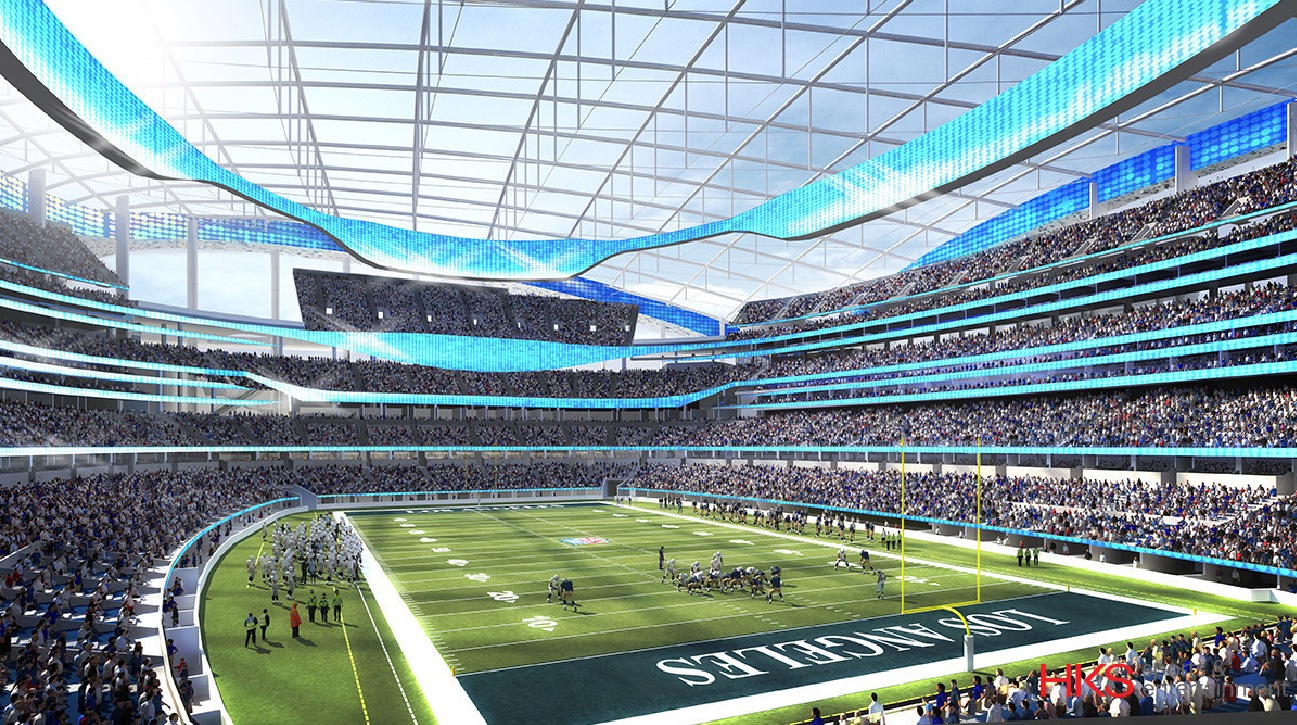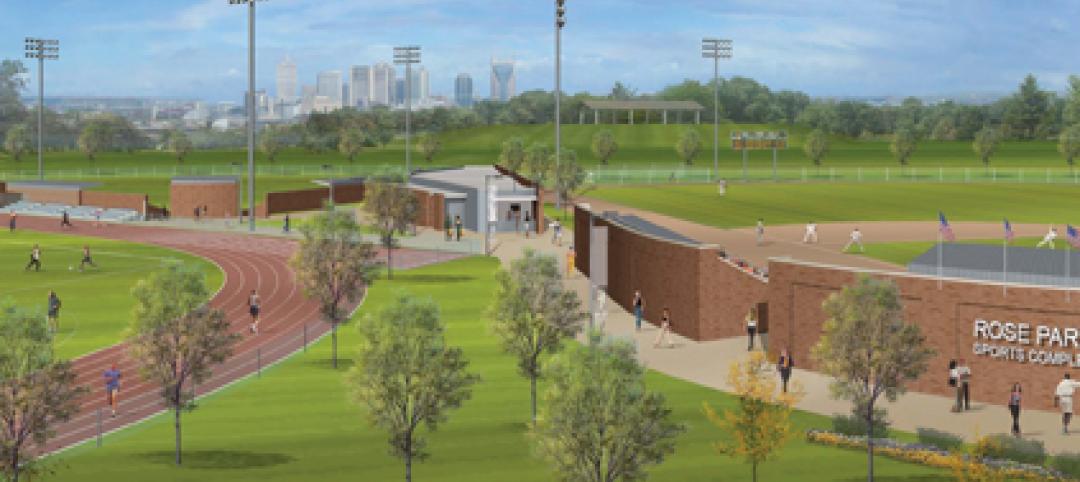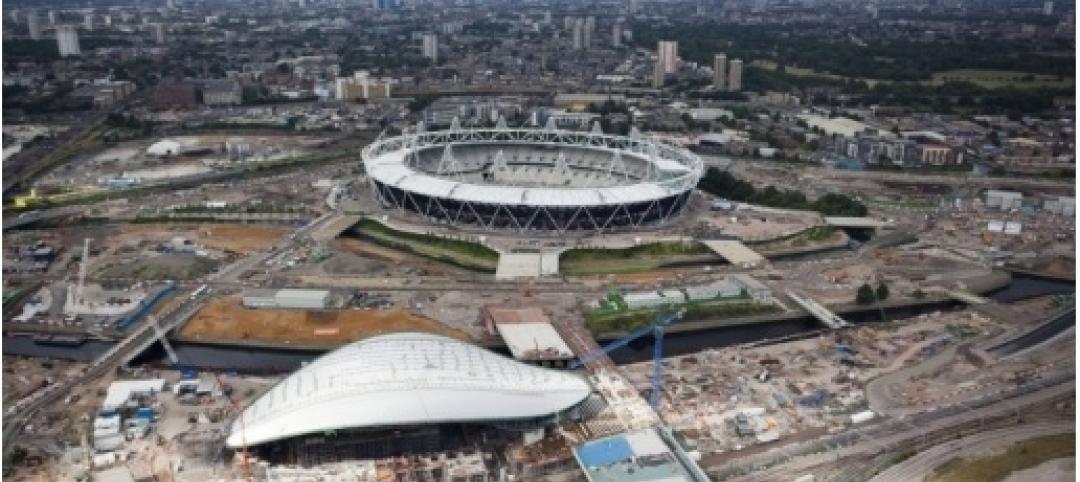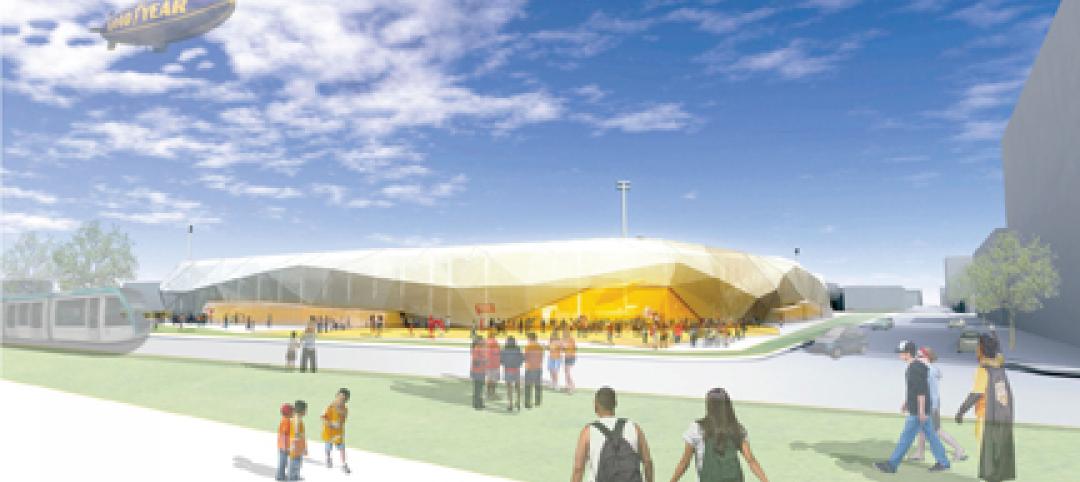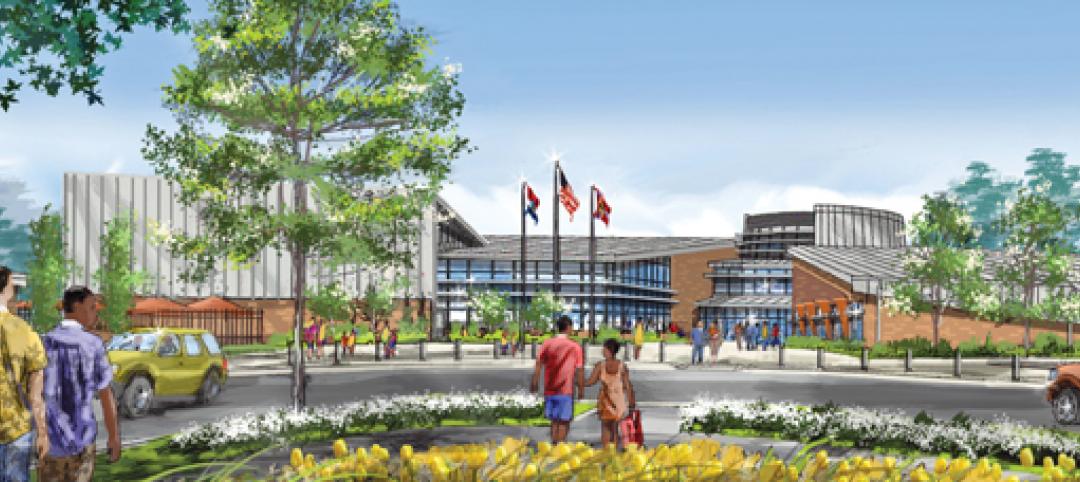After years of rumors and speculation, and with plenty of moving parts that still need to be sorted out, at least one thing is official: the St. Louis Rams are Los Angeles-bound.
The NFL owners voted in favor of the Rams’ plan of moving back to the city they called home from 1946 to 1994.
A new stadium will be built in Inglewood, Calif., on the site of the old Hollywood Park racetrack, roughly 10 miles from downtown Los Angeles. It is expected to be the league’s largest stadium in terms of area (at 8.5 million sf), and will cost between $1.8 billion and $3 billion.
The stadium will be set 100 feet into the ground with a 175-foot above ground profile. The roof will have open air on its sides with metal borders at the top, and the section over the playing field will be made of the transparent ETFE material, which is translucent but immensely strong. The stadium, which will have 70,000 seats and could expand to 100,000 with standing room only capacity, will be part of a 298-acre entertainment, retail, and housing complex.
“It's going to be so much more than going to a football game,” said Mark Williams of HKS, the firm designing the stadium, according to the Los Angeles Times. “You're going to be absorbed into the site, absorbed into the stadium, and get a very wide bandwidth of experience. It's the kind of memory people are going to cherish for a lifetime.”
The NFL is in favor of two teams moving to LA and sharing a stadium. The San Diego Chargers have the option of leaving their digs, the old Qualcomm Stadium, and joining the Rams in becoming co-tenants at the new LA stadium. They have a little more than one year to make a decision. If they decline, then the Oakland Raiders could choose to move from their home, the O.co Coliseum, and play in the new stadium with the Rams.
Meanwhile, both the Chargers and Raiders are working to stay in their current cities (at least that's what both teams’ owners are saying). If they stay, the NFL will give them each $100 million toward a new stadium.
The original plan for the Raiders and Chargers was for the teams to share a stadium, designed by Manica Architecture, in Carson, Calif. That was voted down by the owners in part because of logistics (the league would’ve had to realign divisions), and in part due to location. The $1.7 billion stadium in Carson would’ve been built on top of an old landfill.
 The proposed Carson Stadium was voted down by NFL owners. Rendering: Manica Architecture
The proposed Carson Stadium was voted down by NFL owners. Rendering: Manica Architecture
The next step for the Rams will be to determine where they’ll play next. The team’s temporary home is expected to be the LA Coliseum, a 92-year-old bowl stadium that seats more than 93,000 people. The University of Southern California’s football team currently plays there on Saturdays. Other options for the Rams include the Rose Bowl in Pasadena and Angel Stadium of Anaheim.
Los Angeles has been without football since the 1994 season, when both the Rams and Raiders moved. For the 1995 season, the Rams played at St. Louis’s Busch Stadium before moving into the now-named Edward Jones Dome later in the season. The Rams stayed at the dome through the 2015 season.
The Rams turned down a recent plan to stay in St. Louis, which included a $1 billion HOK-designed stadium on the Mississippi River.
Though financing was an issue for the proposed St. Louis stadium, it’s unclear how serious the team considered the plan. Rams’ owner Stan Kroenke bought the land in Inglewood back in early 2014, which had fueled relocation rumors since.
 The proposed riverfront stadium in St. Louis. Rendering: HOK
The proposed riverfront stadium in St. Louis. Rendering: HOK
Related Stories
| Mar 11, 2011
Community sports center in Nashville features NCAA-grade training facility
A multisport community facility in Nashville featuring a training facility that will meet NCAA Division I standards is being constructed by St. Louis-based Clayco and Chicago-based Pinnacle.
| Mar 11, 2011
Slam dunk for the University of Nebraska’s basketball arena
The University of Nebraska men’s and women’s basketball programs will have a new home beginning in 2013. Designed by the DLR Group, the $344 million West Haymarket Civic Arena in Lincoln, Neb., will have 16,000 seats, suites, club amenities, loge, dedicated locker rooms, training rooms, and support space for game operations.
| Feb 23, 2011
London 2012: What Olympic Park looks like today
London 2012 released a series of aerial images that show progress at Olympic Park, including a completed roof on the stadium (where seats are already installed), tile work at the aquatic centre, and structural work complete on more than a quarter of residential projects at Olympic Village.
| Jan 21, 2011
Sustainable history center exhibits Fort Ticonderoga’s storied past
Fort Ticonderoga, in Ticonderoga, N.Y., along Lake Champlain, dates to 1755 and was the site of battles in the French and Indian War and the American Revolution. The new $20.8 million, 15,000-sf Deborah Clarke Mars Education Center pays homage to the French magasin du Roi (the King’s warehouse) at the fort.
| Jan 20, 2011
Houston Dynamo soccer team plans new venue
Construction is scheduled to begin this month on a new 22,000-seat Major League Soccer stadium for the Houston Dynamo. The $60 million project is expected to be ready for the 2012 MLS season.
| Jan 20, 2011
Construction begins on second St. Louis community center
O’Fallon Park Recreation Complex in St. Louis, designed by local architecture/engineering firm KAI Design & Build, will feature an indoor aquatic park with interactive water play features, a lazy river, water slides, laps lanes, and an outdoor spray and multiuse pool.
| Nov 16, 2010
Brazil Olympics spurring green construction
Brazil's green building industry will expand in the coming years, spurred by construction of low-impact venues being built for the 2016 Olympics. The International Olympic Committee requires arenas built for the 2016 games in Rio de Janeiro meet international standards for low-carbon emissions and energy efficiency. This has boosted local interest in developing real estate with lower environmental impact than existing buildings. The timing couldn’t be better: the Brazilian government is just beginning its long-term infrastructure expansion program.
| Nov 3, 2010
Park’s green education center a lesson in sustainability
The new Cantigny Outdoor Education Center, located within the 500-acre Cantigny Park in Wheaton, Ill., earned LEED Silver. Designed by DLA Architects, the 3,100-sf multipurpose center will serve patrons of the park’s golf courses, museums, and display garden, one of the largest such gardens in the Midwest.


